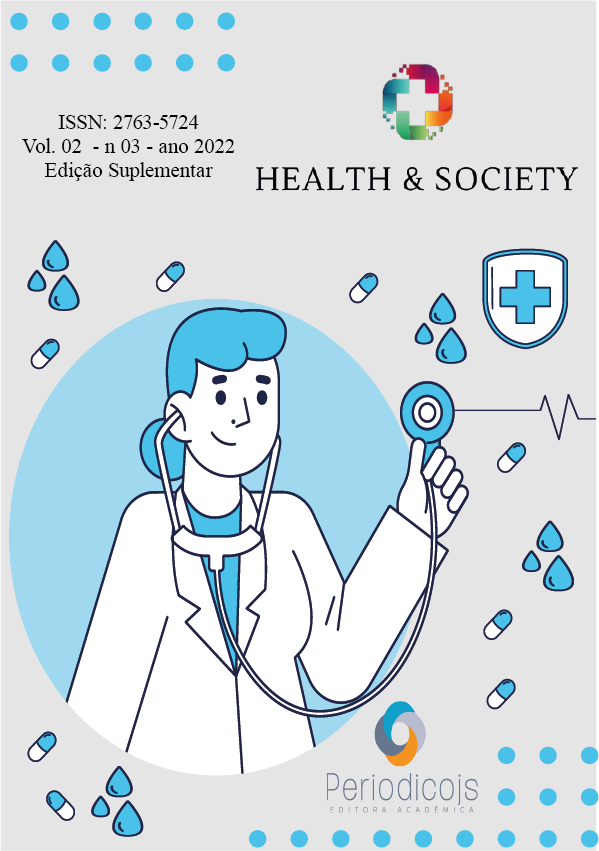Abstract
This article analyzes the potential problems of denialism in the field of health, based on some practical examples, such as the case of the anti-vaccine movement, particularly aggravated by the Covid-19 pandemic, and the use of fake news during the pandemic. of Covid-19 in Brazil, with a parallel between what happened in the anti-retroviral movement in South Africa, and the appearance of the scientific method as a form of combat. A fighting action model suggests that South Africa’s use of antiretrovirals for antiretroviral treatment for HIV caused more than 300,000 deaths between 1999 and 2007. Here, to mitigate the results of denialism . For this, a literature review was carried out. Global analytical studies are toned down and problem-based medicine can contribute to making political movement necessary, more effective against such a phenomenon.
References
BEST, Mark; NEUHAUSER, Duncan. Ignaz Semmelweis and the birth of infection control. BMJ Quality & Safety, v. 13, n. 3, p. 233-234, 2004.
BRYG, Robert J.; JOHNS, Joseph P. Niilismo acadêmico: por que não praticamos o que pregamos? Peito, v. 105, n. 5, p. 1309-1310, 1994.
CALLAGHAN, Christian William. Critical perspectives on international pharmaceutical innovation: Malthus, Foucault and resistance. critical perspectives on international business, 2018.
CHUNG, Kevin C.; RAM, Ashwin N. Evidence-based medicine: the fourth revolution in American medicine?. Plastic and reconstructive surgery, v. 123, n. 1, p. 389, 2009.
COLGROVE, James. The McKeown thesis: a historical controversy and its enduring influence. American journal of public health, v. 92, n. 5, p. 725-729, 2002.
CALLAGHAN, Christian William. Disaster management, crowdsourced R&D and probabilistic innovation theory: Toward real time disaster response capability. International journal of disaster risk reduction, v. 17, p. 238-250, 2016.
CALLAGHAN, Chris William. Surviving a technological future: Technological proliferation and modes of discovery. Futures, v. 104, p. 100-116, 2018.
CALLAGHAN, Chris W. Citizen science and biomedical research: implications for bioethics theory and practice. Informing Science, v. 19, p. 325, 2016.
DUESBERG, Peter. HIV is not the cause of AIDS. Science, v. 241, n. 4865, p. 514-514, 1988.
DEER, Brian. How the case against the MMR vaccine was fixed. Bmj, v. 342, 2011.
FOUCAULT, Michel. The subject and power. Critical inquiry, v. 8, n. 4, p. 777-795, 1982.
FAIRCHILD, Amy L.; OPPENHEIMER, Gerald M. Public health nihilism vs pragmatism: history, politics, and the control of tuberculosis. American Journal of Public Health, v. 88, n. 7, p. 1105-1117, 1998.
FARMER, Paul; NARDELL, Edward. Nihilism and pragmatism in tuberculosis control. American Journal of Public Health, v. 88, n. 7, p. 1014-1015, 1998.
FENTON, Elizabeth; CHILLAG, Kata; MICHAEL, Nelson L. Ethics preparedness for public health emergencies: recommendations from the presidential bioethics commission. The American Journal of Bioethics, v. 15, n. 7, p. 77-79, 2015.
GLICK, Michael. Vaccine hesitancy and unfalsifiability. The Journal of the American Dental Association, v. 146, n. 7, p. 491-493, 2015.
IOANNIDIS, John PA. Contradicted and initially stronger effects in highly cited clinical research. Jama, v. 294, n. 2, p. 218-228, 2005.
ANZIC, Investigadores de Influenza.”Serviços de cuidados críticos e influenza H1N1 de 2009 na Austrália e Nova Zelândia.” New England Journal of Medicine. 361.20 (2009): 1925-1934.
KUHN, Thomas S. The structure of scientific revolutions. University of Chicago Press: Chicago, 1970.
LILIENFELD, Scott O. Pseudoscience in contemporary clinical psychology: What it is and what we can do about it. The Clinical Psychologist, v. 51, n. 4, p. 3-9, 1998.
LAKATOS, Imre. The methodology of scientific research programmes: Volume 1: Philosophical papers. Cambridge university press, 1980.
MOREL, Ana Paula Massadar. Negationism of the COVID-19 and popular health education: to beyond the necropolitics. Trabalho, Educação e Saúde, v. 19, 2021.
NATTRASS, Nicoli. AIDS and the scientific governance of medicine in post-apartheid South Africa. African affairs, v. 107, n. 427, p. 157-176, 2008.
POLAND, Gregory A. MMR vaccine and autism: vaccine nihilism and postmodern science. In: Mayo Clinic Proceedings. Elsevier, 2011. p. 869-871.
RICARD, Julie; MEDEIROS, Juliano. Using misinformation as a political weapon: COVID-19 and Bolsonaro in Brazil. Harvard Kennedy School Misinformation Review, v. 1, n. 3, 2020.
SIMPSON, Andrea; LO, Celia C. Risk society online: Zika virus, social media and distrust in the Centers for Disease Control and Prevention. Sociology of health & illness, v. 41, n. 7, p. 1270-1288, 2019.
SOLOMON, Miriam. Groupthink versus the wisdom of crowds: The social epistemology of deliberation and dissent. The Southern journal of philosophy, v. 44, n. S1, p. 28-42, 2006.
SOKAL, Alan. A physicist experiments with cultural studies. Lingua franca, v. 6, n. 4, p. 62-64, 1996.
STOILOVA, Y.; HRISTOVA, E.; RANGELOVA, V. THE BATTLE OF EVIDENCE-BASED MEDICINE AND ANTI-VACCINATION MOVEMENTS. Trakia Journal of Sciences, v. 16, n. 1, p. 11-16, 2018.
TRANFIELD, David; DENYER, David; SMART, Palminder. Towards a methodology for developing evidence‐informed management knowledge by means of systematic review. British journal of management, v. 14, n. 3, p. 207-222, 2003.
WAKEFIELD, Andrew J. MMR vaccination and autism. The Lancet, v. 354, n. 9182, p. 949-950, 1999.
WASHBURN, Anthony N.; SKITKA, Linda J. Science denial across the political divide: Liberals and conservatives are similarly motivated to deny attitude-inconsistent science. Social Psychological and Personality Science, v. 9, n. 8, p. 972-980, 2018.
WORRALL, John. Why there’s no cause to randomize. The British Journal for the Philosophy of Science, 2007.

This work is licensed under a Creative Commons Attribution 4.0 International License.
Copyright (c) 2022 João Pedro Biasi Toson, Isadora Pereira Rezende





